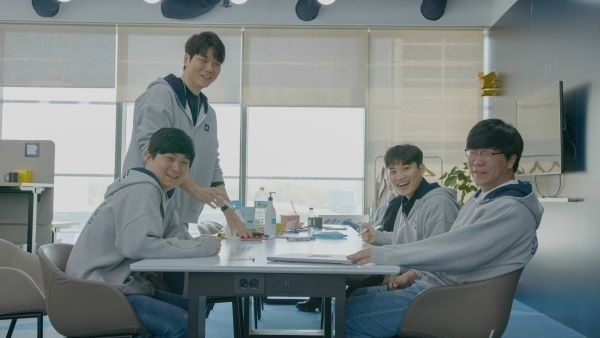Riiid's paper accepted by CVPR, one of the world's top AI conferences
09/04/2023 10:55:03

Photo: From left, Kim Jin-young, Choi Seung-taek, Lee Yun-seong, and Ko Hyo-jun, researchers. of Riiid.
Riiid an AI edtech company, announced today that it has been recognized for its leadership in generative AI, a field of increasing global interest, with the acceptance of a paper at the Computer Vision and Pattern Recognition (CVPR), one of the world's top AI conferences.
Over the years, Lloyd has consistently published papers on its latest AI-enabled research. Since 2016, a total of 17 AI technology papers have been accepted by international conferences, including the world's leading global AI publication NeurIPS, the American Association for Artificial Intelligence (AAAI), the Association for Computational Linguistics (ACL), the North American Association for Computational Linguistics (NAACL), and the European Society for Natural Language Processing (EMNLP).
"Our ongoing research and publications were initiated and completed to solve real-world problems in order to advance our tutor products, such as the AI education platform and Santa for TOEIC," said Dr. Young-Jun Jang, CEO of Riiid. "We will continue to build and share our world-class R&D capabilities in the field of artificial intelligence education technology."
CVPR is the world's leading conference on computer vision and pattern recognition, and the latest research presented at the conference drives innovative technological advances in artificial intelligence and computer vision.
In particular, it is the first time in Korea and the world that an education technology company's AI technology has been recognized for its practicality at CVPR.
This paper is related to image visualization technology using AI and employed different techniques such as 'midjourney', 'dali', 'stable diffusion', etc. which became famous for generating AI images by using existing text inputs. Among the many techniques for generating images using AI, the diffusion model, which has gained the most attention in recent years, is a technique that takes a random inputs, such as noise, and iterates on it until it gradually changes to approximate the desired image, resulting in a more sophisticated and realistic image. Because a huge amount of additional data is required to control this process, Lloyd's researchers have developed a key technique to overcome the data shortage by using diffusion.
The paper was co-authored by seven AI researchers at Lloyd's, with Hyojun Ko and Yoonseong Lee from Lloyd's AI Tents team and Jinyoung Kim from Lloyd's AI Learning team leading the research.
"We are pleased that our efforts to overcome the challenges of using AI to create educational tents have been recognized globally," said Dr. Seung-Taek Choi, who leads the development of content AI technology that generates text, images, and videos with artificial intelligence at Lloyd's. "This research is expected to reduce the cost of data collection required to develop one-to-one AI tutors to provide educational content tailored to each student."
Riiid : https://riiid.com/
View all articles by Reporter Steven Lee
Copyright @Tech Seoul All Rights Reserved.
관련기사
- Luxolis Announces Strategic Expansion into Vietnam and Japan 2024-08-01
- 2Digit Achieved Unprecedented 57-Day Streak at Top of Global LLM leaderboard Competition 2024-05-23
- Crowdworks AI, Participates in VIVATECH 2024 to Expand into European Market 2024-05-20
- Marq Vision provides AI-based ‘impersonation blocking service' 2024-05-12
- Seadronix Innovates Maritime Navigation with AI Technology: Introducing the Rec-SEA Plugin 2024-04-28
- Lansik’s AI glucose management solution Glucofit secures $1M pre-Series A 2024-02-27
- Optimization AI SaaS, Hackle Accelerates Global Presence Through AWS Partnership 2023-11-28
- INFINIQ Unveils ‘AI-Studio’ and ‘HEIDI-ai MAX’ at ADAS & Autonomous Vehicle Technology Expo 2023 Santa Clara 2023-09-23
- Ripple AI Selected for Seoul Business Agency's 2023 SBA Accelerator Round 2 2023-07-22
- Generative AI Company, FriendliAI Releases Public Beta of PeriFlow Cloud 2023-07-20
- SPASS gets FDA clearance for AI-based sepsis diagnosis solution 2023-06-21
- INFINIQ Unveils its Dataset Quality Analytics Report at AVT Expo Europe 2023 2023-06-16
- Quantit, SNU’s College of Engineering sign MOU to promote financial investment model research program 2023-06-09
- Dabeeo Signs MOU with Saba Legend to Monitor Palm Oil Plantation in Malaysia Using Ultra-precision Satellite Images 2023-05-09
- Vive Studios gets the green light to the overseas expansion of its virtual production business 2023-05-08
- Studio Lab Attracts Pre-A Investment From Spring Camp 2023-05-02
- SqueezeBits, Demonstrates World’s Fastest On-device Image Generation AI for Mobile Devices 2023-04-20
- CHEQUER signed a contract to supply AI and Data security solutions to VESSL AI 2023-04-18
- VEStellaLab signs MOU and enter Vietnam market 2023-04-18
- Nadio launches beta Version of 'Nadio Studio' with personalized AI Voice Fonts 2023-04-17
- Annotation AI to Operate 'AI Barista Robot Booth' at 2023 Seoul Coffee Expo 2023-04-13
- Healthcare Startup Algocare Attracts Investment from D-camp 2023-04-13
- Chain Partners Launches AI Branch Solution for Financial Industry 2023-04-07
- INFINIQ Unveils GS-certified Anonymization Solution at Tech.AD 2023 2023-03-30
- Muhayu provides self-introduction AI analysis service with Job Korea 2023-03-22
- MLOps platform 'VESSL AI' has announced a collaboration with 'CHEQUER' to secure data in artificial intelligence. 2023-02-16
- Influencer marketing platform superchart.com launches ChatGPT feature for NAVER bloggers 2023-02-10
- Dabeeo to Expand the Satellite Data Analysis Market Cooperating with Maxar Technology 2023-01-03
